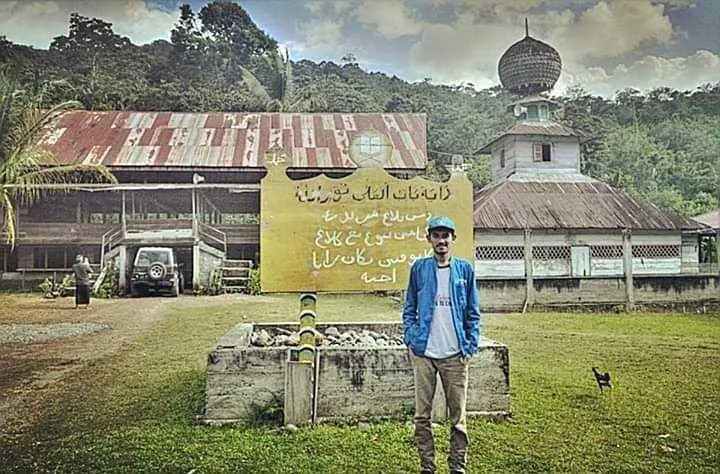
Dear Steemians
One afternoon at the Veranda of Mecca, Lilawangsa Korem (Danrem) Commander Colonel Syafnil Armen got information from his subordinates. The long-awaited information mentioned a well-known cleric from Beutong Ateuh, West Aceh, allegedly possessing dangerous objects.
Teungku Bantaqiah, the ulama's name, is suspected of having stored hundreds of firearms. Other allegations say the weapons were planted around his pesantren. In the Babul Mukarramah Islamic Boarding School in Blang Meurandeh Village, Bantaqiah did indeed support hundreds of students studying religion to him.
The cleric was also suspected of having armed forces totaling 300 personnel. Danrem quickly drew the conclusion: the weapons and forces were related to the activities of the Free Aceh Movement (GAM).
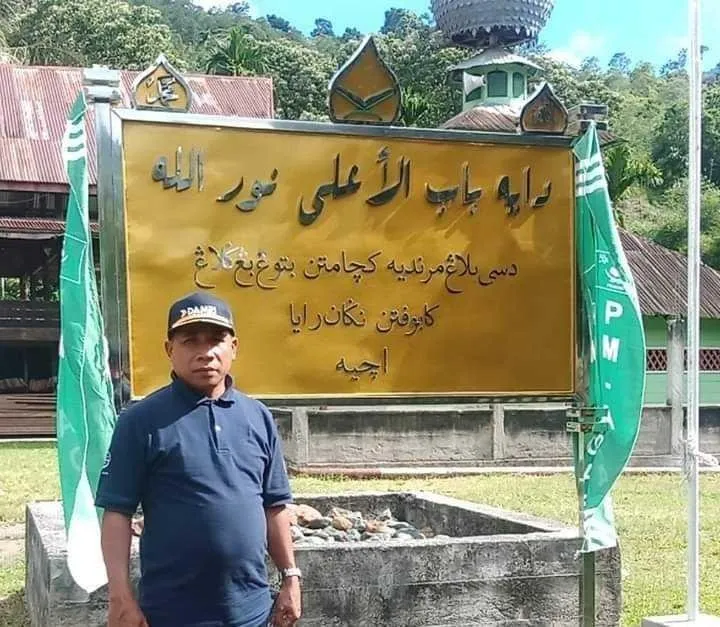
He sent an order via telegram dated July 15, 1999 to several battalion commanders. The essence of the command: search, find, approach, and capture the security intruders and sympathizers, life or death.
Based on Danrem's orders, a combined force of 215 personnel was formed under the leadership of Lieutenant Colonel Heronimus Guru and Lieutenant Colonel Sudjono as operations supervisors. With the exception of Danrem and the joint forces leader, no one expected that the telegram would be disastrous.
On July 22, 1999, joint forces arrived at Beutong Ateuh. They set up tents to prepare for an invasion. Residents around watched the arrival of troops with anxiety.
They do not know why the army came suddenly and in very large numbers. But experience during the Military Operation Zone (DOM) has sharpened their instincts: something will happen. The next day, July 23, 1999, around 11.00 WIB, fully armed troops began to enter the pesantren. Some of them cover their faces with black and green paint.
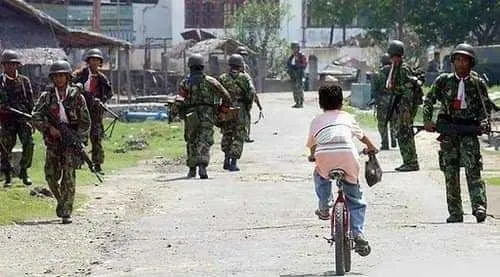
Inside the pesantren complex, several troops conduct psy-war: shouting Bantaqiah's name with blasphemy and insults. Bantaqiah and hundreds of students who were studying the Koran were suddenly tense. Shortly afterwards, Bantaqiah and a student came down to meet them.
After meeting Bantaqiah and conveying their business, Sudjono contacted Heronimus over the radio about what action should be taken. Heronimus never answered. Sudjono left the location.
The inflamed troops searched the pesantren and rudely ordered all adult male santri to come down and gather in the pesantren yard in a squatting position while showing their KTPs. They were told to strip clothes, except for underpants. Along with the search, the team led by Sudjono returned to the location.
The Monitor Report said that Sudjono forced Bantaqiah to surrender all the weapons he allegedly kept. Bantaqiah has denied. He felt he had never had a single weapon as alleged. Not satisfied with Bantaqiah's confession and continued force, the troops also lost their temper.
In the midst of a tense situation, Sudjono questioned a radio transmitter antenna mounted on the roof of the pesantren. He ordered Usman, one of Bantaqiah's sons, to remove him. After that, the atrocity slowly began to manifest itself.
Usman walked to the house to get the equipment to make it easier to disassemble the antenna. But before he reached the house only 7 meters from the gathering place, a force hit him with a firearm. Watching his son being hurt, Bantaqiah also tried to approach and hug him. As Bantaqiah approached Usman, the troops echoed the firing signal.
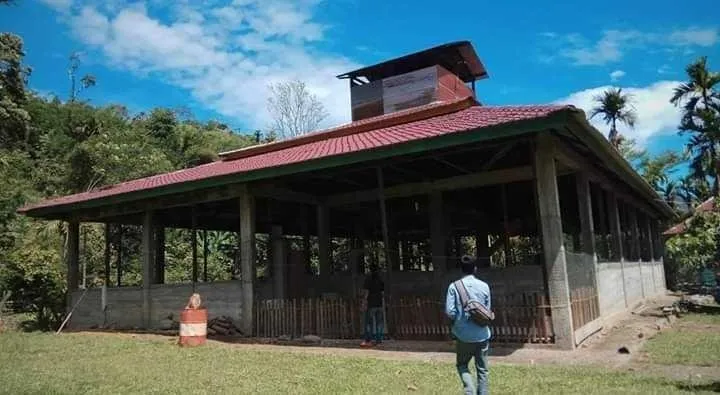
In that instant, Teungku Bantaqiah, a respected cleric throughout West Aceh, fell down covered in blood. He died instantly. The troops then fired consecutive shots and blindly towards the group of students. In less than a minute, 34 students followed the teacher. After a barrage of repetitive shots, the troops gathered the students who were still alive to line up.
Under the pretext of taking them for treatment, students who were injured were transported, and even students who were not injured at all were taken along. A total of 23 people. They were put on trucks to be taken to Takengon. Only a few people are deliberately left out.
On the way, right at kilometer 7, twenty-three students were dropped off and ordered to squat on the edge of a cliff. That's where they were also fired on blindly.
The case of the Bantaqiah massacre and its students in Beutong Ateuh later became a national spotlight, even a worldwide concern. What Sudjono and his men did was included in the category of gross human rights violations.
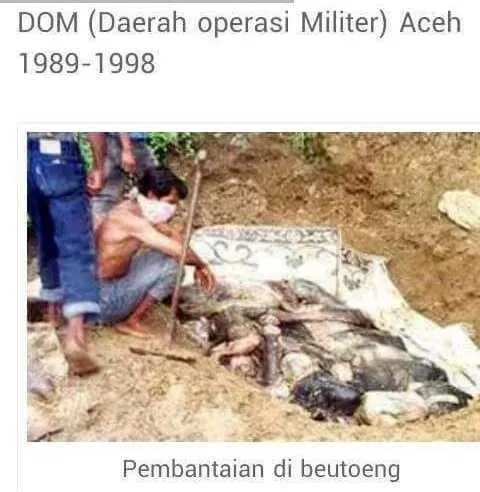
Azhary Basar, a member of the Fact Finding Team (TPF) formed by the Aceh Provincial Government, said there had been a "one-sided shooting" and there was no evidence of "resistance from Tengku Bantaqiah and his followers." One of the people who most actively advocated for the families of the victims was Munir Said Thalib, founder of the Commission for Disappearances and Victims of Violence (KontraS).
He defended their rights and called for the case to be resolved in the fairest possible way. Munir also repeatedly visited Beutong Ateuh to meet Bantaqiah's family and the victims.
In the end, as revealed in The Practice of Torture in Aceh and Papua, 1998-2007 (2008), this case was resolved through a way that was actually very political, namely through a koneksitas court in 2000.
This trial was established to try criminal acts jointly by civilians and the military - something Munir did not really want.
In the trial, of the 25 defendants submitted there were three officers: Captain Anton Yuliantoro, Second Lieutenant Maychel Asmi, and Second Lieutenant Trijoko Adwiyono. The rest are ranks of non-commissioned officers and enlisted officers and a civilian. While Lieutenant Colonel Sudjono was not touched at all.
Munir himself from the beginning demanded that it be resolved through a human rights court, because the massacre was included in the category of gross human rights violations. For him, the trial of the Bantaqiah case was aimed more at meeting the interests and compromises between the political elite and the army.
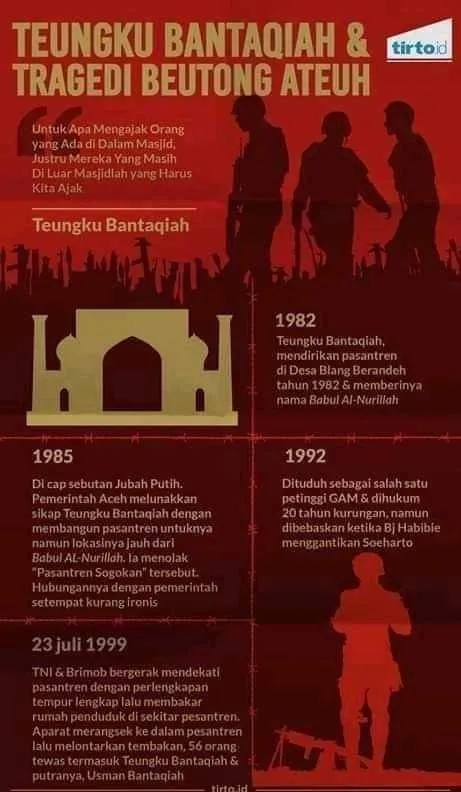
The court's decision also did not pay attention to the overall legal settlement to resolve the Aceh problem. "The trial," said Munir, "is just to show that there is a trial, and ignores the substance of the demands of the Acehnese people who want justice, not just a trial."
Every time he visited Beutong Ateuh, Munir always slept at the pesantren mosque. For days he slept there while using it to meet with the victims' families. After he died, residents agreed to name the place "the Munir Mosque" to honor and commemorate his services.
Thank you for reading